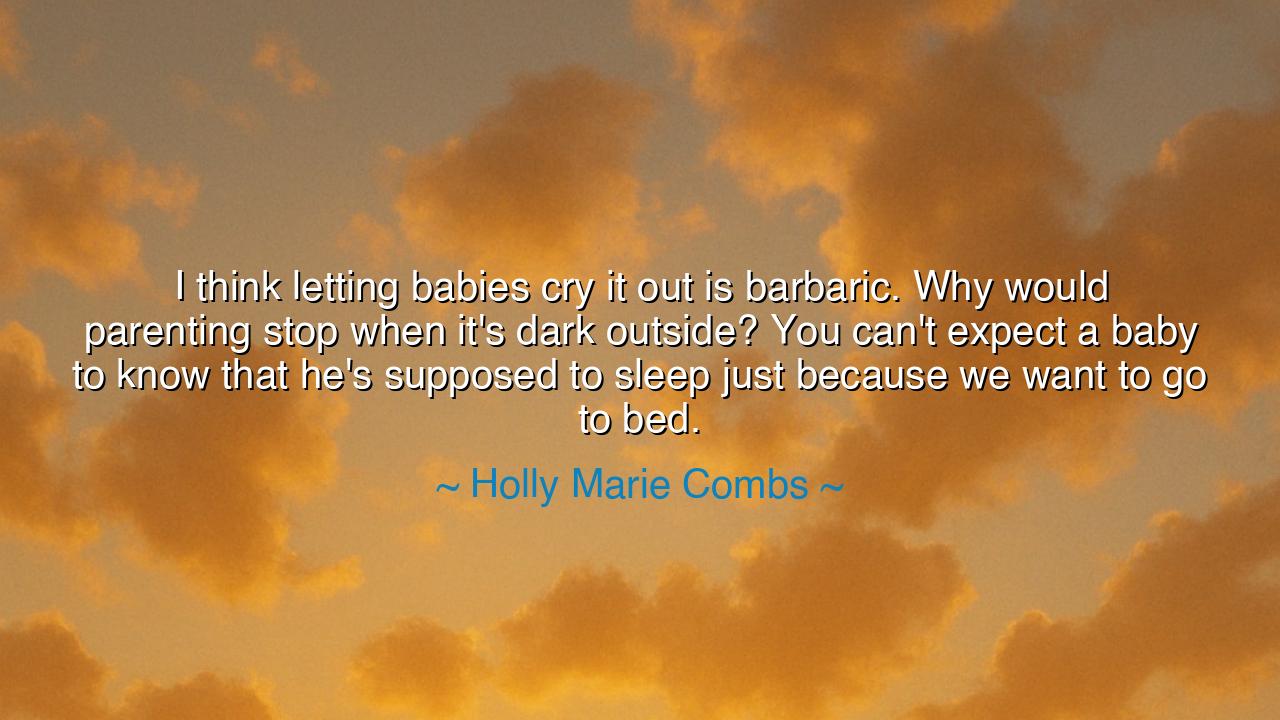
I think letting babies cry it out is barbaric. Why would
I think letting babies cry it out is barbaric. Why would parenting stop when it's dark outside? You can't expect a baby to know that he's supposed to sleep just because we want to go to bed.






Hearken, O seekers of wisdom, to the voice of Holly Marie Combs, who speaks of the tender bonds between parent and child, and of the cruelty disguised as practice when one allows the infant’s cries to be dismissed. In her words, we are reminded that parenting knows no hour, no boundary of night or day. The dark, she insists, is not a veil to hide our neglect; it is a time when the helpless soul, small and new to the world, leans upon us for comfort, guidance, and presence. To silence these cries under the guise of discipline is to mistake convenience for wisdom and to abandon empathy at the altar of routine.
Long has mankind struggled with the tension between order and care, between the desire for personal repose and the sacred duty to another. In the halls of history, we find the echoes of those who understood that the young are not miniature adults but beings whose understanding of time, reason, and expectation is yet to be born. Consider the ancient sages of Greece, who taught that nurture is the foundation upon which character is built. A child left to anguish through the night, even for a fleeting hour, carries within them the seeds of insecurity that may blossom into fear. Combs’ insight is a call to honor the natural rhythms of the infant, to recognize that their world is measured not by clocks but by the presence of those who love them.
In the realm of the modern, let us not forget the story of Benjamin Spock, whose revolutionary teachings on child care in the 20th century championed responsiveness over rigidity. He observed that children thrived when their needs were met with attentive love rather than detached discipline. This historical example illuminates the truth in Combs’ words: the child’s cries are not annoyances to be endured, but messages, profound in their simplicity, demanding acknowledgment and action. To ignore them is to erect barriers between parent and progeny, barriers that may take years to dismantle.
Yet her words also speak to the greater rhythm of human life, the eternal dance between duty and self-care. Parents, too, are mortal, and the demands of night can weigh heavily. Combs does not condemn fatigue but rather calls for a recognition of priority and sacred duty, that parenting does not pause because the day has ended. In this we see an ancient truth: to love is to endure, and to endure is to act in alignment with the highest purpose of our hearts. A night spent soothing a child is not lost; it is a testament to the sacred work of care.
There is, too, a moral clarity in her stance: the child is innocent, not culpable, and the parent is called to embody wisdom and compassion, not mere expedience. One may look to the natural world, where creatures instinctively shield their young from harm, guided not by convenience but by innate duty. The nightingale feeds her fledglings through dark hours, and the lioness stands vigilant while the world sleeps. So must human guardians honor the rhythms of their wards, acknowledging that love demands presence, not convenience.
From her reflection arises a lesson for all who hold the tender in their care: the world of the young is fragile, and emotional security is a treasure more enduring than the fleeting comfort of uninterrupted sleep. Practical actions, therefore, are clear: attend to the child’s cries with immediacy and empathy; structure your life so that the demands of night do not erode the sacred bond; and remember that discipline can coexist with compassion when it grows from understanding rather than imposition. Let the night be a time not of abandonment but of deepened connection.
Finally, Combs’ wisdom reverberates as an enduring call to conscience: parenting is a ceaseless vigil, a labor of love that respects the infant’s inherent rhythms. When darkness falls, do not retreat behind your own fatigue; instead, meet the child in their world, soothe their anxieties, and bear witness to the fragile miracle of new life. For in these acts, quiet yet profound, lies the forging of character, the cultivation of trust, and the perpetuation of love across generations. The lesson, eternal and unyielding, is that presence and compassion are the true marks of a parent, and the cries of a child are not to be silenced but heard as sacred song.






AAdministratorAdministrator
Welcome, honored guests. Please leave a comment, we will respond soon